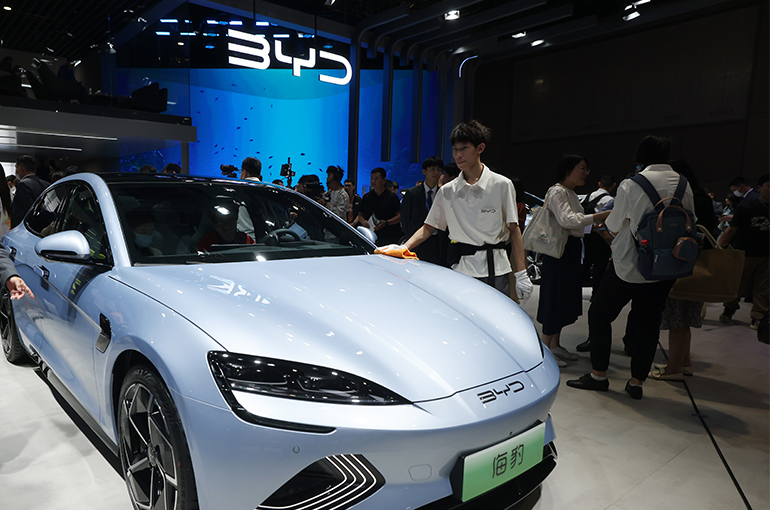 BYD's Revenue Exceeds Tesla's in Third Quarter for First Time, But Its Valuation Remains Far Behind
BYD's Revenue Exceeds Tesla's in Third Quarter for First Time, But Its Valuation Remains Far Behind(Yicai) Oct. 31 -- BYD's revenue topped Tesla's for the first time ever in the third quarter of the year, but the Chinese new energy vehicle giant's valuation remained just over one-seventh of its US competitor.
Revenue soared 24 percent to CNY201.1 billion (USD28.2 billion) in the three months ended Sept. 30 from a year earlier, the Shenzhen-based automaker announced yesterday. Tesla's revenue rose 7.8 percent to USD25.2 billion in the period.
Shares of BYD [SHE: 002594] closed down 4.1 percent at CNY293.19 (USD41.18) in Shenzhen today, giving it a market capitalization of CNY853 billion (USD119.8 billion). In comparison, Tesla's stock [NASDAQ: TSLA] fell 0.8 percent to USD257.55 in New York yesterday, reaching a total valuation of USD807 billion.
BYD's net profit widened 11.5 percent to CNY11.6 billion (USD1.6 billion) in the third quarter from the same period last year. Tesla's net profit calculated according to generally accepted accounting principles jumped 17 percent to CNY2.2 billion.
In the first three quarters of the year, BYD's revenue and net profit surged 19 percent and 18 percent to CNY502.3 billion (USD70.5 billion) and CNY25.2 billion (USD3.5 billion), respectively, from a year earlier. In comparison, Tesla's revenue and net profit totaled USD72 billion and USD2.2 billion.
BYD sold nearly 2.75 million NEVs in the nine months ended Sept. 30, up over 32 percent from the same period last year. Meanwhile, Tesla's sales fell 1.3 percent to about 1.3 million units.
Compared to BYD, which sells NEVs of all price ranges from entry-level to luxury, Tesla only has a few top-selling models, a well-known fund manager in Guangzhou told Yicai. This allows Tesla to better control supply chain costs, even though it outsources battery production, the fund manager noted.
Overall, due to BYD's larger scale and self-supply of key components, including batteries, its cost control is gradually improving, and its bargaining power with suppliers is increasing, the fund manager pointed out.
The two companies' valuation difference is mainly due to the relatively lower risk appetite in China than in the US, said Fu Wenhao, a researcher at Guangdong Cheese Investment Fund. Moreover, Tesla has clearer advantages in terms of globalization and research and development of autonomous driving technologies, Fu added.
Editor: Futura Costaglione